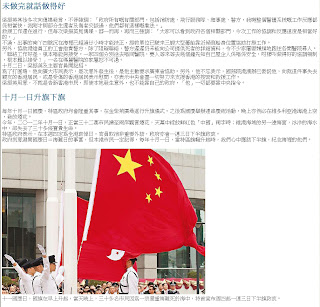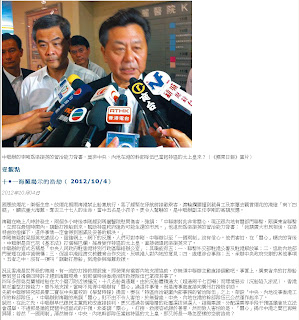來自萌え魔法王国的魔女「pigu魚子」,帶著她的「黑貓使魔」來到了中國廣州、
在一個隱匿的地方,開立了一家見習魔女培訓店--「にゃん~メイド喫茶--nyamaid」。
近期熱門文章
近期網誌簡介

2012年10月30日星期二
2012年10月7日星期日
華盛頓郵報:香港鼓動獨立風
Hong Kong and China: Former British colony clings to its separate identity
The Washington Post 美國華盛頓郵報
By Andrew Higgins, Updated: Sunday, October 7, 7:02 PM
HONG KONG —Chen Zuoer, a Beijing official who helped negotiate Hong Kong’s return to Chinese rule 15 years ago, said on a recent visit here that he was “heartbroken” to learn that Hong Kong protesters have taken to waving colonial-era flags emblazoned with the British Union Jack.
“Those flags should be sent to history museums, rather than being displayed in the streets,” said Chen.
In some way, though, the appearance of old emblems of empire among demonstrators with gripes against Beijing has been a propaganda gift to China’s ruling Communist Party, which has long dismissed protests in Hong Kong as the work of traitorous conspirators loyal to foreign powers, particularly Britain and the United States.
Ta Kung Pao, a Hong Kong newspaper controlled by the party, seized on the flag-waving as evidence of the danger posed by a small group of “ambitious wolves” bent on bringing chaos to the former colony in the service of China’s foes. “There is no need for Chen Zuoer to be heartbroken,” the newspaper intoned, asserting that most Hong Kongers embrace their city’s “inseparable ties to the motherland.”
The number of people parading colonial-era symbols has been minuscule and doesn’t reflect any widespread hankering for a return of British rule. But, after 15 years as part of China, a population that is overwhelmingly Chinese and deeply proud of its Chinese heritage has increasingly come to view the rest of the country as a source of trouble, not pride, that needs to be kept at arm’s length.
Britain’s retreat from Hong Kong in 1997, which turned a “crown colony” into a “special administrative region of China,” marked a singular, triumphal moment in a historical narrative at the heart of the Communist Party’s legitimacy: only the party can “wipe clean the shame” of colonial-era humiliations and fully represent the national aspirations of all Chinese. Beijing used to denounce its critics here and elsewhere as “anti-communist” but now vilifies them as “anti-China,” an insult that turns any challenge to the ruling party into an assault on the Chinese nation.
In the years since it returned to Chinese rule, however, Hong Kong has repeatedly rejected Beijing’s Communist Party-dominated take on Chinese patriotism.
It cheers Chinese athletes at the Olympic Games, honors Chinese astronauts and holds a big firework display to celebrate China’s October 1 national day, which was marred this year by a Hong Kong ferry crash in which at least 39 people died.
But from protests by half a million people in 2003 over a proposed anti-subversion law demanded by Beijing to recent demonstrations against the introduction of patriotic education in schools, Hong Kongers — nearly all Chinese by blood, culture and language — have in large numbers defied Beijing’s patriotic story line of an ecstatic reunion of a long-divided family with a common identity.
“Of course, I’m Chinese. One hundred percent Chinese,” said Kenny Choi, a 23-year-old who works in a printing factory and took part in a protest last month that featured the waving of British colonial-era flags. “But I don’t trust Chinese Communists. . . . Hong Kong is different and has to preserve its own values.” Choi joined the rally, held at Sheung Shui railway station near a border crossing to mainland China, to express his anger over throngs of mainland traders who pour in each day by train to buy baby formula, cosmetics and other goods for resale back on the other side of the border.
The Washington Post 美國華盛頓郵報
By Andrew Higgins, Updated: Sunday, October 7, 7:02 PM
HONG KONG —Chen Zuoer, a Beijing official who helped negotiate Hong Kong’s return to Chinese rule 15 years ago, said on a recent visit here that he was “heartbroken” to learn that Hong Kong protesters have taken to waving colonial-era flags emblazoned with the British Union Jack.
“Those flags should be sent to history museums, rather than being displayed in the streets,” said Chen.
In some way, though, the appearance of old emblems of empire among demonstrators with gripes against Beijing has been a propaganda gift to China’s ruling Communist Party, which has long dismissed protests in Hong Kong as the work of traitorous conspirators loyal to foreign powers, particularly Britain and the United States.
Ta Kung Pao, a Hong Kong newspaper controlled by the party, seized on the flag-waving as evidence of the danger posed by a small group of “ambitious wolves” bent on bringing chaos to the former colony in the service of China’s foes. “There is no need for Chen Zuoer to be heartbroken,” the newspaper intoned, asserting that most Hong Kongers embrace their city’s “inseparable ties to the motherland.”
The number of people parading colonial-era symbols has been minuscule and doesn’t reflect any widespread hankering for a return of British rule. But, after 15 years as part of China, a population that is overwhelmingly Chinese and deeply proud of its Chinese heritage has increasingly come to view the rest of the country as a source of trouble, not pride, that needs to be kept at arm’s length.
Britain’s retreat from Hong Kong in 1997, which turned a “crown colony” into a “special administrative region of China,” marked a singular, triumphal moment in a historical narrative at the heart of the Communist Party’s legitimacy: only the party can “wipe clean the shame” of colonial-era humiliations and fully represent the national aspirations of all Chinese. Beijing used to denounce its critics here and elsewhere as “anti-communist” but now vilifies them as “anti-China,” an insult that turns any challenge to the ruling party into an assault on the Chinese nation.
In the years since it returned to Chinese rule, however, Hong Kong has repeatedly rejected Beijing’s Communist Party-dominated take on Chinese patriotism.
It cheers Chinese athletes at the Olympic Games, honors Chinese astronauts and holds a big firework display to celebrate China’s October 1 national day, which was marred this year by a Hong Kong ferry crash in which at least 39 people died.
But from protests by half a million people in 2003 over a proposed anti-subversion law demanded by Beijing to recent demonstrations against the introduction of patriotic education in schools, Hong Kongers — nearly all Chinese by blood, culture and language — have in large numbers defied Beijing’s patriotic story line of an ecstatic reunion of a long-divided family with a common identity.
“Of course, I’m Chinese. One hundred percent Chinese,” said Kenny Choi, a 23-year-old who works in a printing factory and took part in a protest last month that featured the waving of British colonial-era flags. “But I don’t trust Chinese Communists. . . . Hong Kong is different and has to preserve its own values.” Choi joined the rally, held at Sheung Shui railway station near a border crossing to mainland China, to express his anger over throngs of mainland traders who pour in each day by train to buy baby formula, cosmetics and other goods for resale back on the other side of the border.
2012年10月6日星期六
2012年10月4日星期四
訂閱:
留言 (Atom)


















































